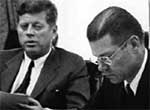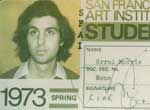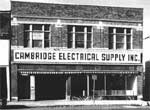By David Kleiler
We are now fully aware of the deep loss to the entire film community with the tragic death of Karen Schmeer. Her professional accomplishments and her personal warmth and humor made a lasting impression on all, and are being celebrated by all.
But there is a story about Karen's contribution to film that less than a handful of people know.
I had known Karen for nearly twenty years. Although we were never close friends, we were always friendly. She came to work at the Coolidge just after it had reopened when she was a student at Boston University. She had worked at a movie theatre in her native Portland, Oregon before she came to Boston. With enthusiasm and humor, she courteously sold popcorn and tickets. Her friendly manner and ready smile sold lots of popcorn. The staff loved her and she even volunteered to go to another staffer's home to make sandwiches for the 24-hour Science Fiction Marathon.
Another contribution was to come, for in some inconspicuous way, she played a part in the road to international fame of the Alloy Orchestra.
The Alloy, as currently constituted, is a 3-piece progressive, highly percussive group that plays their own newly composed scores to silent film classics. They've been performing this way for over 20 years. Prior to that a larger group performs annually at the kiosk on the Boston Common on First Night.
Their first film was Fritz Lang's METROPOLIS, shown in late June of 1991 as part of a repertory series we programmed in conjunction with the annual convention of the American Association of Architects. The only good print at the time was one restored by Giorgio Morodor with op songs by Pat Benetar and Loverboy. We Killed the film sound track and the Alloy came to the rescue.
Although there were only 90 people for the first show, Karen, taking a break from her popcorn duties, was one of them. The next night, she was back, this time dressed in clothes other than what she wore to work. With her was her teacher, mentor and close friend, film critic and scholar Gerry Peary. Gerry was so impressed with the Alloy that the next time he came he brought Errol Morris, not often seen on the south side of the Charles. Morris was so impressed that he had Caleb Sampson, the orchestra's composer to score his next two films FAST, CHEAP AND OUT OF CONTROL and MR. DEATH. Morris also brought Karen to work at his studio, first as a receptionist and researcher, then as his trusted editor. Ultimately, she received editing credit for FAST, CHEAP AND OUT OF CONTROL and MR. DEATH, and most notably for the Academy Award winning THE FOG OF WAR, where Morris, in his acceptance speech, acknowledged Karen's contribution to the film.
Finally, the next time Gerry and Karen came to see the Alloy they brought Bill Pence, not only a film professor at Dartmouth, but also the film programmer for the legendary Telluride Film Festival. He was so impressed that he gave the Alloy an annual presence at Telluride, where they would perform the world premiere of their latest score for another silent film classic.
In the years after she left the Coolidge, I would see her intermittently.
She arranged Gerry's 50th birthday party at his North Cambridge home, and I would see her at various film festivals, notably Sundance and Toronto, and places that some film she edited was showing. We sat near each other at the Sundance world premiere of MR. DEATH. It was a work-in-progress screening, and Karen and I had a good conversation about the remaining editing challenges. When we would see one another, she would always greet me with a big smile, but maybe I provoked her wry sense of humor.
The last time I saw her was last year on a shuttle bus at Sundance (I'm pretty sure Karen would not have liked the limo treatment). She was there in conjunction with the world premiere of SERGIO, the great film about the man who ran the UN Headquarters in Baghdad, only to die when it was bombed. It was the best film I saw that year at Sundance, and it's an extraordinary testimony to Karen's editing skills. SERGIO got the award for Best Editing.
Life can be a series of "What Ifs?" What if Karen hadn't come to work at the Coolidge and never saw METROPOLIS? What if Karen hadn't brought Gerry to hear the Alloy? And what if Karen hadn't stopped to buy groceries on that fateful night? It is safe to say that although the Coolidge can take some credit for matching the Alloy with silent films, this little act of Karen's provided the path for the Alloy to achieve the success they have.
The Alloy factoid may not seem like much, and she would probably be embarrassed that I'm making so much of it. But it does seem to be in keeping with the low profile of the Karen we knew and loved. At that time, just after the Coolidge had been saved, she seemed to be happy to be part of something that had a new vitality and vision and she eagerly shared in that. As she developed, her accomplishments in film and her contributions to the community she inhabited were enormous. She will be deeply missed.






